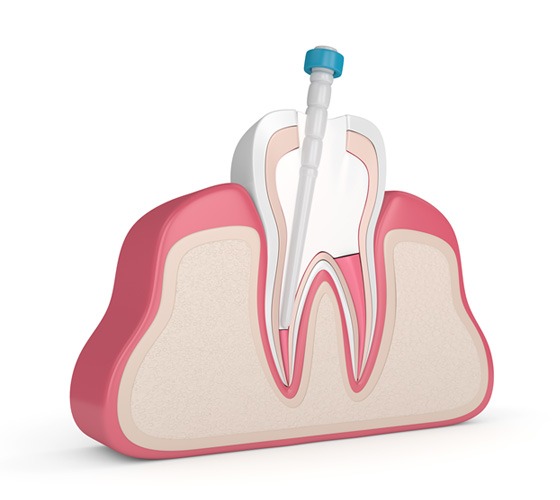Root Canal Treatment – Austin, TX
Restore Your Smile’s Core Strength
Root canals have a little bit of a nasty reputation. People often associate them with pain, assuming that the procedure is intense and invasive. The fact is that, if you have a serious toothache, a root canal is often a painless way to help you feel your best again.
If you’re dealing with serious tooth pain and you’re around Austin, a root canal from Magnolia Family Dentistry could be just what you need. Reach out to us and we’ll be happy to talk to you about the treatment.
Why Choose Magnolia Family Dentistry for Root Canal Treatment?
- Sedation Available for Anxious Patients
- Compassionate, Friendly Dental Team Who Will Attend to Your Needs
- Capable of Treating Patients of All Ages
Do I Need Root Canal Treatment?

Root canal treatment involves removing the root pulp from the interior of the tooth, typically to deal with a severe infection present in the area. Such infections are typically associated with a painful toothache, as well as swelling and visible irritation around the tooth. If the condition is especially severe, this may be associated with a foul taste in the mouth or even an abscess in the area. Patients dealing with these symptoms should seek a dentist’s attention immediately and may need a root canal in order to deal with the issue.
The Root Canal Process

Before the root canal begins, your mouth will be completely numbed with a local anesthetic. This ensures that you won’t feel any part of the root canal process, ensuring your complete comfort. We will then open a hole in the tooth and, via the use of special instruments, extract the diseased pulp from within. A substance called gutta percha will then be used to fill the gap left by the procedure, giving the tooth structure.
Root canals are typically finished off with a dental crown. We will take an impression of your tooth and design your restoration, sending our notes off to a lab where it will be produced. You will wear a temporary crown while this is happening, and we will call you back to our office when your final restoration is complete.
The Benefits of Getting a Root Canal

Despite their reputation, root canals are typically one of the least invasive methods of dealing with a severely infected tooth. The procedure is comfortable and, unlike extractions, allows you to keep your original tooth intact. Patients often see root-canaled teeth last for the rest of their life without any further complications.
Your dental crown will blend in perfectly with the rest of your smile, meaning that you won’t have to worry about the tooth standing out. With all that this treatment can do, there’s nothing to stop you from reaching out if you’re suffering from a toothache.
Understanding the Cost of Root Canals

While root canals are hardly deserving of their bad reputation, we’re still aware that many patients are made nervous by the procedure. The last thing we want is for the financial component of your dental care to contribute to that, so we try to make it as easy as possible to pay for your root canal.
We’ll give you a complete estimate for the price of your procedure when we meet you in person, but here’s what you should know before then about what this treatment generally costs.
Factors That Can Affect Root Canal Cost

We can’t necessarily tell you exactly what your root canal is going to run you before we meet because of the various factors that can influence this treatment’s cost. The price of your root canal treatment can go up or down depending on a few factors, like:
- The type of tooth that’s being treated. Molars have more root tissue than incisors, and they’re therefore more expensive to deal with.
- Where the tooth is in your mouth.
- How advanced the infection is.
- Whether or not your tooth is broken or impacted.
- What kind of dental crown you want for your tooth.
If your treatment is sufficiently complicated, it may be necessary to bring in an external specialist to take care of your root canal. They will have their own cost for their services.
Is it Cheaper to Pull My Tooth?

If you’re only looking at the upfront cost of the treatments, it may certainly seem like removing your tooth is a cheaper option when compared to root canals. However, there’s a hidden cost associated with the procedure that you might not have considered—that of tooth replacement.
Simply leaving a hole in your smile after the tooth extraction has been completed can cause serious complications. Not only will this impair your ability to eat and talk, it can also cause serious misalignment as the surrounding teeth rush to fill the gap.
For this reason, people who get a tooth extraction will need to make use of a dental bridge, denture, or dental implant to replace their tooth. When this cost is factored in, root canals become the much more affordable option.
Does Dental Insurance Cover Root Canals?

Root canals are a major medical procedure used to deal with serious infections. As such, dental insurance companies are usually willing to pay for at least a portion of the procedure.
This depends on the details of your plan, but insurance will usually cover 50-80% of the cost of your root canal treatment. We will help you work with your insurance company to make sure that you’re getting the most out of your benefits.
Other Options for Making Root Canal Treatment Affordable

We also know that not everyone has insurance, which is why we make it a point to offer our patients a variety of options that can make their services from us more affordable. For one, we’re currently offering a special on emergency exams that makes getting care when you’re in pain much more affordable.
We also frequently work with CareCredit, a financing firm that can allow you to split the bill for your dental care across several monthly payments. If you’re interested in learning more about the financial options available to you, make an appointment with us today and we’ll be happy to help you!
Root Canal FAQs
How Long Does It Take to Recover from a Root Canal?
Not every patient will have the same recovery time following their root canal. Some individuals may be able to return to their normal routines the following day while others (particularly those with physically demanding jobs) might benefit from taking two or three days off work.
Some soreness might occur, but it should start to fade after about three days. If the discomfort lasts longer than expected or is growing more severe, you should call us right away.
Can I Eat Before a Root Canal?
It depends on the situation. If you plan on having sedation administered during your root canal, you may be asked to avoid eating for a few hours prior to the procedure; otherwise, you could experience nausea. On the other hand, if you aren’t undergoing sedation, it may be beneficial to have a meal a couple of hours beforehand. This is because once your root canal treatment is complete, you’ll have to wait a couple of hours for the numbness in your mouth to wear off before it’s safe for you to eat again.
Additionally, you should stay away from alcohol entirely for a full day prior to your procedure since alcohol can potentially alter the effects of the local anesthetic.
How Long Does a Root Canal Take?
Some root canal treatments are more complex than others and thus might require more time. Typically, it may be between 30 and 90 minutes. Note that if the procedure involves the teeth near the back of the mouth, it’s likely to take longer due to there being more roots to clean.
Most of the time, it will only take one appointment to complete your root canal treatment. That said, it’s not unheard of for two to be required in certain cases.
What Happens If You Wait Too Long for a Root Canal?
An infected tooth is not a problem that will go away on its own; on the contrary, it will continue to grow more severe the longer it remains unaddressed. The pain might eventually stop, but this can actually be a sign of the issue worsening due to the nerves of the tooth being destroyed. Eventually, the infection may start to spread to other parts of the mouth. If the problem becomes severe enough, a tooth that could potentially have been saved with a root canal treatment might have to be removed to protect your oral health.
Are Root Canals Painful?
Root canal treatment is actually much more comfortable than many people realize. The mouth will be kept numb with a local anesthetic, and sedation can be used as well. After the treatment, you may notice that your mouth is somewhat sore or more sensitive than normal. This discomfort should eventually go away on its own; until then, you can keep it under control with over-the-counter pain relievers.
